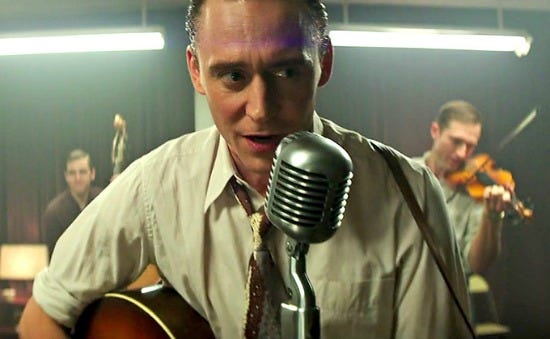I Saw the Light

I wanted to love this movie but did not. I admired it, enjoyed it, will certainly recommend it to you. But love is too big a word.
Tom Hiddleston plays country music legend Hank Williams, who died in 1953 at the age of just 29, leaving behind dozens of songs that are still iconic — “Your Cheatin’ Heart,” “Move It on Over,” etc. He died long enough ago, right at the start of the information age, that he seemingly belongs to a different epoch, sliding in somewhere between history and mythology.
“I Saw the Light” was written and directed by Marc Abraham, a longtime producer who directed one other feature, the overlooked 2008 drama, “Flash of Genius.” It’s based on a biography by Colin Escott, George Merritt and William MacEwen.
The film adaptation lands as a fairly conventional music-star bio, charting Williams’ slow rise to fame and gradual decline due to ill health, poor choices and barrels full of alcohol.
Parts of the story are very strong, others less so, but we’ve seen it all before — the boozin’ and druggin’, stretches laid up in a hospital bed, the birddogging with a revolving door of beautiful young women while the resentful wife back home complains about how he’s always on the road singing for their supper.
I did learn a few things about Williams I didn’t know before, like that he had spina bifida, causing lifelong pain that spurred him toward drink. Or that, at the height of his fame, he recorded under the pseudonym of Luke the Drifter, a fictional half-brother, spouting pastoral recitations about life and loss. They didn’t sell very well, but he did it just because it gave him an outlet for thoughts he couldn’t express in his honky-tonking tunes.
Hiddleston is very fine in the role, and I’m sure he will get some consideration when the next awards season rolls around. He plays Williams as a man who is simultaneously very self-aware and a mystery to himself. He does the things he does because it’s the way he was made, even if it causes himself and others pain. He was the man who smiled at everybody and sang about tragedy and heartbreak.
“I show it to them. So then they don’t have to take it home,” he grudgingly explains to a mystified reporter.
The actor sounds really, really good singing in the movie. I’m not sure how much he sounds like Hank Williams. Not enough twang and moan to pass as authentically hillbilly. Hiddleston is a Brit, after all, and even Americans north of the Mason-Dixon line struggle with the Southern sound. But I believed him as somebody people would pay money to hear.
Elizabeth Olsen plays Audrey Williams, his first wife and manager, and she’s anything but the usual wallflower. She’s depicted as tough, smart, self-preserving, edging into domineering. Audrey wanted her own singing career but didn’t have the pipes — “She sounds like a damn billy goat!” is how one heckler puts it — and blames him for not helping her along. They cause each other plenty of strife, and at some point she checks out emotionally. We can’t really blame her.
The film’s biggest misstep is to break up the story with supposed archival interviews of actual figures in Williams’ life, like producer Fred Rose (Bradley Whitford). Abraham tries to employ this as a tool to relay the expository stuff as seamlessly as possible. But it still comes across as a lame “Behind the Music” knockoff.
“I Saw the Light” is a solid biography, but it doesn’t really stand out from the pack. Like “Ray” and “Walk the Line,” the film is good at capturing the essence of an artist but has trouble bending a big, untidy life into a straight narrative line.



